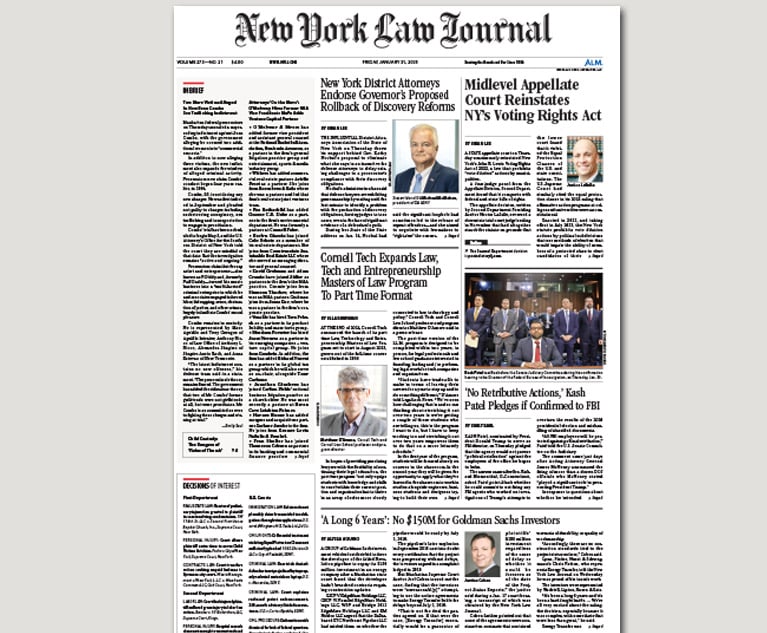Foreign Expatriates and U.S. Discrimination Lawsuits
In this column on corporate employment issues, Philip M. Berkowitz provides tips on dealing with executives and trainees sent by foreign companies to the U.S. to hold positions with their U.S. subsidiaries.
July 08, 2020 at 01:30 PM
9 minute read
 Philip M. Berkowitz
Philip M. Berkowitz
Japanese and other foreign companies often send executives and trainees to the United States to hold positions with their U.S. subsidiaries as "seconded" employees. Expatriates are representatives of their companies, both practically and symbolically. How they interact with local hires, and the way they themselves are treated by the employer, inevitably will send a message to U.S. employees.
This messaging, whether intentional or not, can make American employees proud to be associated with the company—or, in a worst case, may cause the employees to feel they are being unfairly treated, or victims of discrimination.
One major distinction between expatriates and local hires is their respective terms and conditions of employment. Between salary and expatriate benefits, expatriates may be paid substantially more than what the position would pay if it were offered to a local hire.
Expatriates may also receive various benefits that are not available to U.S. employees, regardless of their national origin. The benefits may take the form of housing allowances, or health or pension benefits that are intended to mimic what the expatriate would have received had they remained in their home country. The benefits may be better than those received by Americans, and vice-versa.
U.S. laws prohibit employers from discriminating based on, among other things, race or national origin. U.S.-based employees might claim that favorable treatment given to expatriates constitutes unlawful discrimination. However, there are numerous defenses to claims of this nature that are available to foreign companies who bring seconded employees into positions of this nature.
But as discussed below, even if the process is lawful, the treatment of expatriates may cause resentment among U.S.-based employees. Foreign companies must anticipate this reaction, and they can lessen resentment and feelings of unfair treatment by taking steps to integrate the expatriates culturally into their U.S. workforce, while retaining their legal distinction from local hires.
Background: FCN Treaties
The Friendship, Commerce and Navigation (FCN) treaties between the United States and Japan, Korea and other countries, permit the foreign companies doing business in the United States to engage "accountants, and other technical experts, executive personnel, attorneys, agents and other specialists of their choice." These treaties may permit the foreign parent to favor expatriate employees in these positions.
Congress designed the treaties to establish a rule of law that would govern everyday relations between the signatories, and to protect citizens and their property from the rigid employment controls of operating in a foreign country. The employer-choice provisions take several different forms in the various FCN treaties. The most common is the one found in the Japanese and Korean treaties, which allow companies to engage executives "of their choice."
The FCN treaties permit favorable treatment based on citizenship only, not national origin. But because Japan and Korea are relatively homogeneous societies with regard to national origin, a claim of "disparate impact" discrimination based on the employer's exercising its treaty right to prefer its own citizens for management positions will also be barred by the FCN treaty.
However, the FCN treaties generally require that expatriates be sent to the United States on an "E" visa, which is reserved for "treaty traders." See, e.g., MacNamara v. Korean Air Lines, 863 F.2d 1135 (3d Cir. 1988). Further, the individuals must generally be at the senior executive levels described above.
Even if the individuals are not protected by an FCN treaty, courts may permit the foreign parent to favor expatriates in certain positions or provide them with special benefits under two other theories: first, if the parent can show that there is a "business necessity" to provide this favorable treatment, it may prevail in a discrimination case. And second, the foreign parent may prevail in a discrimination case if it can show that the U.S. local hires are not "similarly situated" to the expatriates, and therefore that any claim of discrimination is not valid.
'Similarly Situated' Discrimination Claims
A foreign company may be able to defend a claim of intentional discrimination by arguing that U.S. employees are not "similarly situated" to the foreign expatriates.
In Plahutnik v. Daikin Am., 912 F. Supp. 2d 96 (S.D.N.Y. 2012), the plaintiff was laid off during a reduction in force by the U.S. subsidiary, and sued, claiming that Japanese expatriates were not terminated, and this constituted unlawful discrimination. The company argued that the plaintiffs could not prevail because they were not "similarly situated" to the Japanese expatriates. The court denied the defendant's motion for summary judgment, holding that there were genuine issues of fact as to whether the U.S. employees and expatriates were similarly situated, because:
- The Japanese expatriates were reviewed in their job performance by the CEO of the U.S. subsidiary, as opposed to by supervisors located in Japan;
- The expatriates were on the subsidiary's payroll;
- S. taxes were withheld from their pay; and
- There were no written policies that stated that the subsidiary had no authority to terminate the expatriates' employment.
The court ruled that these factors created issues of fact as to whether the U.S. and Japanese employees could be similarly situated, and that the question could be resolved only at trial.
Similarly, in a related case, Brown v. Daikin Am., 756 F.3d 219 (2d Cir. 2014), the Second Circuit Court of Appeals held that whether the expatriates and local hires were similarly situated was a question of fact that could not be determined prior to allowing discovery. The court also noted that employees may be similarly situated if they are "subject to the same standards governing performance evaluation and discipline."
There was a different, more favorable result for the employer in Schanfield v. Sojitz Corp., 663 F. Supp. 2d 305 (S.D.N.Y. 2009). There, the plaintiff was a locally hired American who challenged the rotational system as discriminatory. He claimed, among other things, "the rotational system is the equivalent of a corporate caste system in which the rotational staff—which is exclusively Japanese/Asian—is given preferential treatment over national staff—which is predominantly non-Japanese/non-Asian."
On the parties' motion for summary judgment, the court held that rotational employees were not similarly situated to the plaintiff and other national employees in all material respects when considering the following factors:
- Different employers: The plaintiff and the other national employees were employed by the U.S. subsidiary, while the comparator rotational employees were ultimately employed by the parent company, which assigned them to their positions and set their compensation.
- Compensation decision-maker: Compensation decisions for rotational employees were made in Japan by executives of the parent company, while pay of locally hired employees was determined by the U.S. subsidiary.
- Different treatment of Japanese expatriates and locally hired Japanese-American employees: U.S.-based employees who were Japanese and/or Asian by national origin did not receive any of the benefits provided to rotational employees in terms of pay. Therefore, there was no national origin discrimination.
- Special costs associated with overseas secondment: It was incorrect to compare national employees' pay to the total compensation of rotational employees, because rotational employees incur special costs associated with their overseas secondment which shall be reflected as special overseas allowances in their compensation, including allowances for travel, housing, schooling and transportation.
Interestingly, in the Sojitz case, the Sojitz America employee handbook made clear that expatriates were employees of the parent company, and that they were considered to be employees of both the parent and the U.S. subsidiary.
Practical Considerations
To be able to assert the protection of the FCN treaty, the foreign parent should, to the extent it can, utilize E-1 visas when sending to the United States accountants and other technical experts, executive personnel, attorneys, agents and other specialists. Trainees and more junior employees should, to the extent it is practical, continue to be on the payroll either of the parent or of the payroll company. Further, to the extent it is practical, the executives and trainees should report to home-country employees, and they should be evaluated by those employees.
The company should also consider articulating, in English, a policy that explains the nondiscriminatory business-related reasons for sending expatriates to the United States. In this way, the parent and subsidiary will be better positioned to defend claims of discrimination brought by U.S.-based employees by utilizing the defenses provided by the FCN treaty, a "business necessity" defense, or a defense that the U.S. employees are not similarly situated to the expatriates.
Steps to Avoid Resentment and Lawsuits
Despite what may be the lawful nature of treating expatriates differently than local hires, the employer should anticipate that doing so may cause resentment among U.S. employees. Employees who feel they are being treated unfairly are more likely to challenge the different treatment as discriminatory.
To help avoid hurt feelings and misunderstandings, therefore, foreign companies should consider doing the following:
- Avoid holding expatriate-only meetings. Americans should be included in business meetings, and English should be spoken if possible.
- Translate foreign-language comments as soon as they are made: If the foreign language is spoken in the presence of Americans, whether in large meetings or in small groups, then the statements should be simultaneously translated, as a matter of courtesy, for the American attendees.
- Minimize outside gatherings: Expatriates should try to include local hires in such social gatherings outside the office.
- If managers from the overseas parent visit the subsidiary, there should be an effort made to include Americans in meetings with those executives.
Finally, foreign companies should provide training in U.S. employment law to their expatriates as soon as they arrive in the United States (if not before), in order to emphasize to them the special laws prohibiting discrimination, harassment, and retaliation; U.S. whistleblower laws; and the increasing risk in particular of harassment cases in the wake of the #MeToo movement. Similarly, senior executives visiting the United States should receive some training prior to their visits.
Philip M. Berkowitz is a shareholder of Littler Mendelson and co-chair of the firm's U.S. international employment law and financial services practices.
This content has been archived. It is available through our partners, LexisNexis® and Bloomberg Law.
To view this content, please continue to their sites.
Not a Lexis Subscriber?
Subscribe Now
Not a Bloomberg Law Subscriber?
Subscribe Now
NOT FOR REPRINT
© 2025 ALM Global, LLC, All Rights Reserved. Request academic re-use from www.copyright.com. All other uses, submit a request to [email protected]. For more information visit Asset & Logo Licensing.
You Might Like
View All
Orrick Hires Longtime Weil Partner as New Head of Antitrust Litigation

Profits Surge Across Big Law Tiers, but Am Law 50 Segmentation Accelerates
4 minute readLaw Firms Mentioned
Trending Stories
- 1Uber Files RICO Suit Against Plaintiff-Side Firms Alleging Fraudulent Injury Claims
- 2The Law Firm Disrupted: Scrutinizing the Elephant More Than the Mouse
- 3Inherent Diminished Value Damages Unavailable to 3rd-Party Claimants, Court Says
- 4Pa. Defense Firm Sued by Client Over Ex-Eagles Player's $43.5M Med Mal Win
- 5Losses Mount at Morris Manning, but Departing Ex-Chair Stays Bullish About His Old Firm's Future
Who Got The Work
J. Brugh Lower of Gibbons has entered an appearance for industrial equipment supplier Devco Corporation in a pending trademark infringement lawsuit. The suit, accusing the defendant of selling knock-off Graco products, was filed Dec. 18 in New Jersey District Court by Rivkin Radler on behalf of Graco Inc. and Graco Minnesota. The case, assigned to U.S. District Judge Zahid N. Quraishi, is 3:24-cv-11294, Graco Inc. et al v. Devco Corporation.
Who Got The Work
Rebecca Maller-Stein and Kent A. Yalowitz of Arnold & Porter Kaye Scholer have entered their appearances for Hanaco Venture Capital and its executives, Lior Prosor and David Frankel, in a pending securities lawsuit. The action, filed on Dec. 24 in New York Southern District Court by Zell, Aron & Co. on behalf of Goldeneye Advisors, accuses the defendants of negligently and fraudulently managing the plaintiff's $1 million investment. The case, assigned to U.S. District Judge Vernon S. Broderick, is 1:24-cv-09918, Goldeneye Advisors, LLC v. Hanaco Venture Capital, Ltd. et al.
Who Got The Work
Attorneys from A&O Shearman has stepped in as defense counsel for Toronto-Dominion Bank and other defendants in a pending securities class action. The suit, filed Dec. 11 in New York Southern District Court by Bleichmar Fonti & Auld, accuses the defendants of concealing the bank's 'pervasive' deficiencies in regards to its compliance with the Bank Secrecy Act and the quality of its anti-money laundering controls. The case, assigned to U.S. District Judge Arun Subramanian, is 1:24-cv-09445, Gonzalez v. The Toronto-Dominion Bank et al.
Who Got The Work
Crown Castle International, a Pennsylvania company providing shared communications infrastructure, has turned to Luke D. Wolf of Gordon Rees Scully Mansukhani to fend off a pending breach-of-contract lawsuit. The court action, filed Nov. 25 in Michigan Eastern District Court by Hooper Hathaway PC on behalf of The Town Residences LLC, accuses Crown Castle of failing to transfer approximately $30,000 in utility payments from T-Mobile in breach of a roof-top lease and assignment agreement. The case, assigned to U.S. District Judge Susan K. Declercq, is 2:24-cv-13131, The Town Residences LLC v. T-Mobile US, Inc. et al.
Who Got The Work
Wilfred P. Coronato and Daniel M. Schwartz of McCarter & English have stepped in as defense counsel to Electrolux Home Products Inc. in a pending product liability lawsuit. The court action, filed Nov. 26 in New York Eastern District Court by Poulos Lopiccolo PC and Nagel Rice LLP on behalf of David Stern, alleges that the defendant's refrigerators’ drawers and shelving repeatedly break and fall apart within months after purchase. The case, assigned to U.S. District Judge Joan M. Azrack, is 2:24-cv-08204, Stern v. Electrolux Home Products, Inc.
Featured Firms
Law Offices of Gary Martin Hays & Associates, P.C.
(470) 294-1674
Law Offices of Mark E. Salomone
(857) 444-6468
Smith & Hassler
(713) 739-1250








